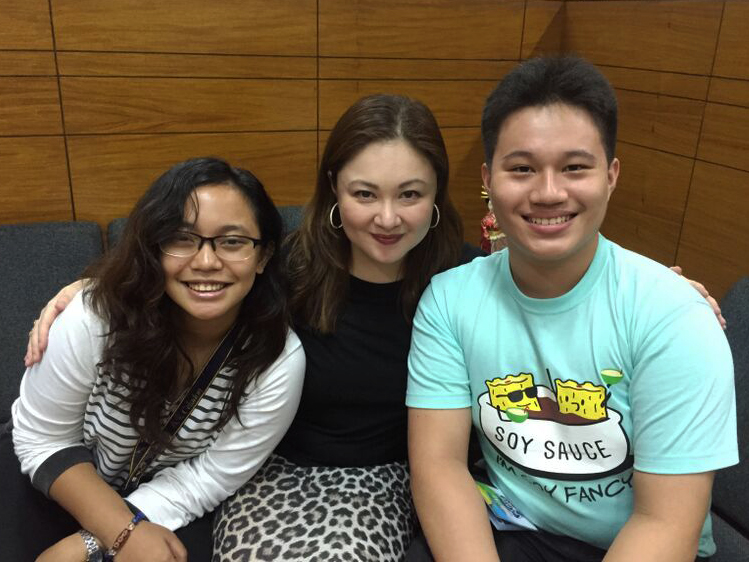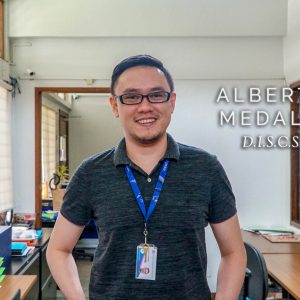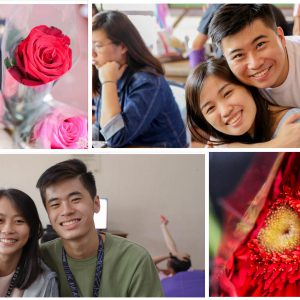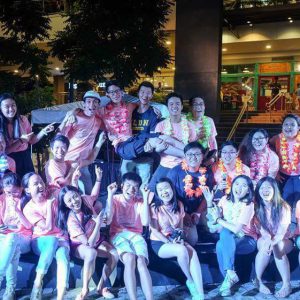Andre Tan and Joal Rose Lin interview Prof. Lailani Gotao of the History Department for Teachers’ Appreciation Week.
Andre Tan (AT): Why did you choose to be a professor?
Lailani Gotao (LG): My background is actually Legal Management, so I was supposed to become a lawyer. I changed my mind, and for a long time I wasn’t really sure what I wanted to do. And so, I packed my bags and went to China, and spent some time there travelling and studying. When I got back, I tried to think again about what I wanted to do with my life. It took a few years; and then one day, I just decided I wanted to take my Masters in History. They have a program here that if you work as a research assistant or a graduate assistant for a department, your studies are free—it’s like a free tuition. They offered me that position when I was a graduate student; and then at the same time, you get to be mentored by full professors. Sometimes, when they’re not here, when they have conferences, they ask you to teach the class for them. It’s also like an OJT, and I liked what I was doing, so I decided to do it for good. It wasn’t planned, it just fell on my lap.
Joal Lin (JL): Did you take a minor or major in History?
LG: No, my background was totally Management. Like I said, I really thought I was gonna go to law school, so everything I prepared myself for was towards that goal. But when I changed my mind about [it], I suddenly didn’t know what I as gonna do. Sometimes, when times are confusing, you become Daoist instead of Confucian, right? You just have to go with the flow because it will resolve itself, and it happened for me.
JL: Why China, though?
LG: After I graduated from college (just don’t ask me the year anymore), I knew a lot of people who decided to study in China, except that I deferred. I wasn’t ready to live away from home after graduating from college, but it was always at the back of my mind. As time went by, I knew more people who went to China and had a good experience. I come from a traditional Chinese family, so it was easier to get permission to move away from home to study Chinese in China than asking permission to go to Europe or something. It was easier, and I really wanted to live away—like, live abroad, experience life abroad.
AT: What do you love most about teaching?
LG: What I love most about teaching… is the students. Of course there’s the academic fulfillment, I get to share my passion for Asian History with the younger generation. The challenge is how to use history to give them a sense of identity. Secondly, this job keeps me young! I get to talk to people who are on trend with latest things, and every day is a different day. Even if I teach the same things, I’m always teaching it to a different set of people, and they all have different dynamics. Each class is unique. The reactions are different, the questions are different; it’s always exciting. I get to come home from my job feeling happy, with a new story to tell because something funny always happens during the day, and I get to learn new things from the kids. For example last year I learned about “bae” and “I ship you,” and I get to use those words in my daily life! You know, those crazy trivial things? It just makes me laugh. Teaching may not pay well financially, but the satisfaction you get is priceless. It’s really for the kids and because of the kids.
AT: What’s the best memory you’ve had?
LG: Every semester, there’s a different thing to remember. That’s why, when I asked you guys to introduce yourself at the beginning of the semester, and I asked you to say something cool or weird about yourself, sometimes, that introduction sticks to my mind already. I remember you by how you introduced yourself. You also remember the cool and weird things from the semester; sometimes, it has nothing to do with the lessons. It’s just the mixture of the people. Every semester does something memorable. I remember funny things even from the very first batch that I taught. It’s always the cool and weird things that I remember.
AT: What do you do when you aren’t teaching?
LG: When I’m not teaching, I’m checking your papers, and preparing for class, and posting on Edmodo. I have to take care of my household! I have to go do the grocery. I have to do yoga. I have to cook. I have to take care of my dog. I have to go have lunch with my friends. I do normal things. I can’t teach every day, it’s tiring; it’s tiring for me.
JL: Teachers have normal lives.
LG: Yeah I know, like there was one time somebody told the teachers here “Sir, nagma-mall ka pala.” And he was like, “Don’t I have the right to be in the mall?” Yeah. I do normal things.
AT: What valuable lesson did you learn from a teacher?
[Joal mentions that her teaching style is similar with Ambeth Ocampo’s.]
LG: Because, guess who was my mentor when I was the graduate assistant?
AT: Sabi na eh!
LG: I was his teaching assistant for a few years. Everything I learned about teaching came from two sources; I was the teaching assistant of two professors: Dr. Ocampo, and Father “Joey” Cruz. Both taught HI165. Their styles are—they’re good friends—but their styles are very different from each other. From Dr. Ocampo, I learned that you shouldn’t be afraid to deal with the subject with humor and lightheartedness, and the people in the history books are people just like us, you know. We put ourselves in their shoes except that they were probably at the right time and at the right place to make certain decisions. I teach you guys that history is our story, and it’s something that should mean something to us. It’s something that if taught well, can make sense of our daily lives, and can be included in our daily conversations. That’s what I learned from him.
From Father Cruz, I learned about how to be meticulous. I don’t know if you’ve noticed, but I’m very OC. Things have to be very clear with the students. There’s a way to do everything properly. There are forms to fill up in everything, so it’s a mix of being light-hearted but also being very organized and precise to the point that the grading system has to be super clear. It felt like my training was really the best of both worlds.
AT: Why shouldn’t you have become a teacher?
LG: If I had to feed a family of five, I shouldn’t have become a teacher. If you’re practical, it’s really just the money; then don’t be a teacher. But with teaching, there’s a different fulfillment. If you find yourself in a “comfortable” position, then you better find something to do that changes the world a little bit for the better. Because some people have to make a living, they can’t be choosy about the kind of job they have, but if you are in a privileged position, where you’re able to choose what you want to do, you should choose something that will make the world a better place. If you don’t then you wasted the position that God has put you in. You know what I’m saying? I was lucky enough to be born under a star like that. I had parents who were able to provide well for their family, so I had the luxury of choosing this job.
JL: Ma’am, I heard that you were a president of LEX?
LG: Yes! I was the president of LEX for two years. When I was a senior I wanted to quit and turn it over to someone else, but the officers under me wouldn’t allow me to do so. They wanted me to do another year. They said that they’ll quit if I stopped, so I continued, but it was a good experience because I got to continue the programs I started, and we were able to do a lot of good things—I think we were the ones who made the motto.
JL: So you were aiming for law school?
LG: Yes, I was aiming for law school. Our projects in LEX involved meeting with a lot of lawyers and attending trials in the court house, and that’s where it all came from. I didn’t see myself doing corporate law, because in corporate law, you just make contracts and you have to stay in the office. I’m a very idealistic person; I have a thing about making a difference in the world, and I realized that being a lawyer won’t help me achieve that goal. I stayed, but I think I would’ve made a good lawyer because my background really is that—LM and then LEX president, so the path was already there. But sometimes, it’s just not your calling.
Imagine, my whole life I thought I was going to be a lawyer and everything was set towards that path, but in the end it didn’t happen. Sometimes you just have to go with the flow and see what happens. Confucianism and activism can only prepare you for so much and in the end, you just have to let go and see what happens. I don’t regret my choice—my choice in life.




